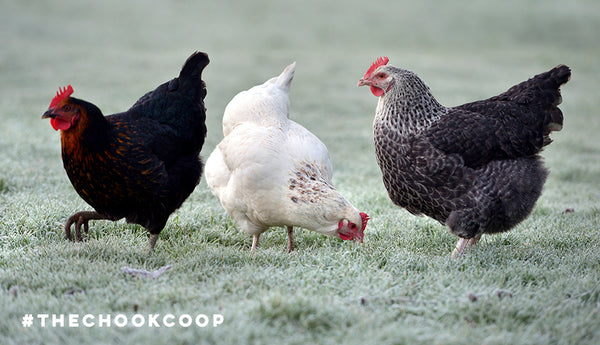
Though Australia isn’t really renowned for experiencing frosty winter, it is still important to recognise that there is an increase in the predator threat to your flock as the temperature starts to drop. This does not mean that you need to move your chickens into the spare bedroom and board the windows shut – there are plenty of small measures you can take to make a big impact on the safety of your chooks. This easy step by step guide will help you prepare and protect your flock and coop from the cooler months ahead.
Why is there are greater predator threat throughout winter?
Winter is Australia is almost laughable compared to climate in the Northern hemisphere, like Canada and the United States, however there is still an increase in predator presence over these chillier periods, especially in colder regions around the Australian Capital Territory, western New South Wales, Victoria and Tasmania, just to name a few. Wild animals go through a period of privation through winter, which basically means there natural food supplies are diminished due to the change in climate. This in turn causes them to wander far and wide looking for alternative food supplies - namely whatever they can find in your chicken coop.
What predators should I be on the lookout for?
Throughout the colder seasons the same types of predators will be lurking about, however they are likely to be more desperate due to the change of season. Things like mice, rats, possums, quolls, foxes, dingos and perhaps even eagles and hawks might try to steal a quick meal from your backyard if the coop is not adequately protected.

Are all predators just trying to get my chickens?
It’s a misconception that all predators that might try to pry their way into your coop are going after your precious little chooks. Most of the time these creatures are looking to get their hands on the chicken feed or leftover treats you’ve lovingly given to your flock. Creatures like mice, rats and possums, especially love eating leftover feed and treats that your full chickens may have left uneaten inside your coop. This being said, once these smaller predators have gained access to your coop they may go after less expendable things like eggs, baby chicks or maybe even small bantam chooks.
Here are some things you can do to predator proof your coop…
-
Give your coop the once over
At the change of each season it’s a good time to make sure that your chicken coop is both structurally sound and secure. Checking that all the panels are secure, the locks on the nesting boxes are functioning and ensuring that all the galvanised wire meshing is firmly attached are all essential things you can do in the lead up to winter. If you have a quality coop, like the Penthouse or Mansion, this is likely to be an easy job, however if your chicken house is getting a little bit old, you may need to perform some basic maintenance to sure your girls home will be safe from predators.
-
Make sure you chickens are safe inside the coop before sundown
A lot of predators tend to be nocturnal creatures, so it may still be safe to let your girls live it up in the winter sun throughout the day, but by nightfall it’s imperative that you ensure the entire flock is safe inside their hutch. Many chickens develop the healthy habit of returning to the coop to roost as the sun begins to set, so the important thing for you to remember is that the door leading into the hutch is closed at the end of each day. One great option is to consider getting the Auto Door that will automatically open and close the door each day, at a predetermined time that you can select. A perfect solution for any chicken lover who might have trouble getting up early or tends to work quite late.

-
Clear away any excess food or treats at the end of each day
Though your flock would have been delighted when you left a nice bowl of warm porridge inside the coop that morning, it’s essential that you clear it at the end of each day, along with any other excess treats or feed, which might lure curious and hungry predators to your coop. Keeping your feeder and waterer inside the hutch is normally a good idea in general, but especially in winter when there are more predators about searching for an easy meal – simply move the chickens feed and water supply into their sleeping quarters at the end of the day to help deter any night time pests.
-
Clear eggs from the nesting boxes as soon as possible
It’s good practice to make sure the eggs don’t spend too much time uncollected, as your chooks might develop the slightly irritating habit of egg eating, which is also a little weird if you think about it too much. Nevertheless, eggs will be another draw card for smaller predators during winter that might be looking for a little late night snack. Ideally it’s best to check for eggs once in the morning and again in the evening.
-
Predator proof your coop
There are many things you can do to help prevent predators however in the event they find their way to your backyard, regardless of how hard you’ve tried to deter them, it’s important that your coop will be able to defend itself. There are a number of cost effective and handy predator-proofing products you can implement in your backyard. Wire mesh flooring is one of the best ways to deter predators, like foxes, dingoes and domestic dogs, which might try to burrow their way into the coop. Simply lay the wire mesh flooring under the coop and these types of predators will simply give up and move on, while you and your flock sleep all night in peace. Electric poultry fencing is a strong deterrent to all predators, including sly foxes. Have a look at our electric chicken fence here. For some different ideas check out our Mother Hen Tips on predator prevention here.
-
Get yourself an animal protector
There are a number of animal allies that you can bring into your backyard family to help protect your flock all year round. Dogs are a common choice, but it’s important that you train them to understand that the chooks are friends and not foes. If you’re a bird lover another bright idea would be to get yourself a small flock of Guinea fowl, which will not only defend your chooks against predators and clear your yard of pests, these quirky song birds will be sure to let you know when there is anything unexpected in your yard. Lastly, roosters are also a smart idea if you want an extra pair of eyes on your birds. Traditionally rooster have been used to warn both the chickens and owners when something untoward was close by. Be careful not to let the rooster into the hutch at the end of the day though, otherwise you might get a few more chooks than you bargained for.
Another bright security idea – if you’re already at your animal limit – would be to purchase a predator sensor light, which is the perfect way to scare off nocturnal predators during those long winter nights.
Protecting your flock over the cooler months is actually quite easy so long as you are prepared and aware of the slightly increased risk. Clearing excess food, reinforcing your coop and ensuring that your girls are locked up by sundown are just some of the ways you can keep them safe. Ultimately, ensuring that your flock is protected by a strong, sturdy coop, reinforced by top quality galvanised wire meshing, is the best way to put up a strong defence against predators, not just in winter, but all year round.
From foxes and rats to quolls, no wonder those pesky predators are one of the biggest worries faced by chicken keepers. Winter or Summer, no one wants to spend their time guarding their flock family against intruders.
If you're in need of the best advice and information to keep your flock safe, it's your clucky day! Our friends at Chickenpedia have created a fantastic Poultry Predator Protection course. Sleep soundly knowing your chickens are safe from predators. Discover ways to keep intruders out of your coop, learn how to identify predators, and become the ultimate security eggspert.
To find out about seasonal predators and issues to consider for your flock, you should also check out their brilliant Weatherproof Chickens course. They have compiled a guide of everything you need to keep healthy chickens through the seasons (which is more than you think!) with a great set of checklists and downloads to keep. Dangerous concerns including pests, dehydration and frostbite can be avoided with the correct information and actions. Whatever the weather, this course will help you keep your chickens happy and healthy all year round.
Protect your flock today- check out Chickenpedia and their brilliant courses. I highly recommend their beginner-friendly, well-structured courses to all my readers!


















